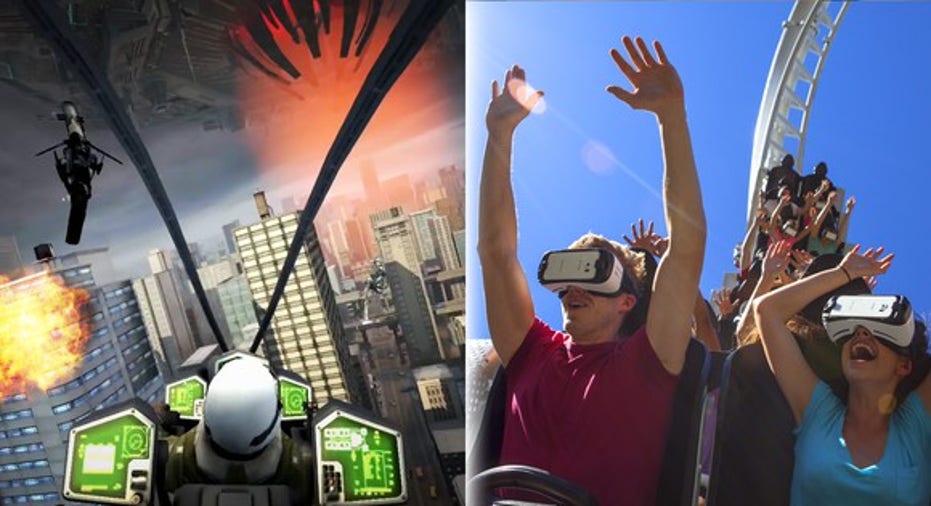2 Surprising Stocks That Could Benefit From Virtual Reality

Image source: Six Flags
Demand for virtual reality is set to explode. BI Intelligence estimates that the market for virtual reality hardware will hit $2.8 billion in 2020, up from just $37 million this year.As the technology matures and sees widespread adoption, many companies, such as those that specialize in graphical processors, gaming consoles, and engrossing content, could enjoy tremendous upside.
Although VR is in its infancy, many investors are aware of these companies, and some of the stocks in the space already seem to be benefiting from the projections.But there are other companies less obviously connected to it that could also see a boost from VR in the years ahead. Among them: Six Flags (NYSE: SIX) and its rival Cedar Fair (NYSE: FUN).
VR roller coasters
In March, Six Flags launched North America's first VR roller coaster, The New Revolution. Visitors to Magic Mountain in California strap on VR headsets before riding the 113-foot tall steel coaster. Rather than take in the real scenery around them, guests perceive themselves as sitting in the cockpit of a digital fighter jet, facing off against a horde of alien spaceships.
Reviews of The New Revolution have generally been positive, though some visitors have complained of long wait times. The VR headsets may enhance the experience, yet they complicate the process, adding an extra step to ride preparation. Six Flags' management, however, is undeterred. "It was a bit of a learning curve," CEO John Duffey admitted on the company's most recent earnings call. "[But] I can tell you the throughput over time has continued to improve ... and our ultimate goal is that we should really see no decrease in throughput..."
Over the past five months, Six Flags has launched VR rides at eight other parks, and plans to bring it to a tenth park in the near future. "[G]uest feedback has been outstanding," Duffey said.
Rather than construct entirely new rides around VR, Six Flags has taken the tack of retrofitting existing coasters. The New Revolution, for example, made its debut as Great American Revolution back in 1976. VR headsets aren't free, but they aren't particularly expensive either. "The good news is that it's relatively low cost," Duffey said.
Those low cost investments are driving traffic to Six Flags' parks. Attendance rose 7% last quarter. Management said its VR coasters were playing a role, and that they should continue to drive further attendance gains in the months ahead.
Cedar Fair could unveil a VR ride next year
Cedar Fair, by contrast, has taken a more tentative approach. To date, it has yet to announce any specific VR rides. Still, management has been clear that it's exploring the technology, as well as related alternatives, including augmented reality. It seems likely that Cedar Fair will launch a VR coaster (or a series of coasters) at some point in the near future.
"[W]e will be testing a new virtual reality attraction in several of our parks. This is just another example of our broad approach of testing VR in our parks as we look to find the operational and commercial sweet spot ..." said CEO Matt Ouimet during the company's most recent earnings call.
Later, Ouimet offered additional color, giving the technology a 2017 timetable. "I think we have cracked the code on virtual reality in the coaster. We will have a plan for it next year ... [and we'll]do it in a way that doesn't provide a disservice to those that [aren't interested in the technology]."
Anadvantage for theme parks
Some might argue that VR will work against these companies, giving consumers another reason to stay home. Already, there are some compelling in-home VR experiences that attempt to mimic the experience of riding a traditional roller coaster. But at least for the time being, VR faces a number of limitations that could give theme parks an edge.
VR has no shortage of proponents, but it also has also a fair number of detractors. As a maker of interactive entertainment, Take-Two's business could benefit from widespread VR adoption. But CEO Strauss Zelnick is skeptical. Earlier this year, he openly doubted the appeal of in-home VR solutions, arguing that most consumers simply don't have the free space required. Some high-end headsets, like the Vive and PlayStation VR, require several dozen open square feet to function properly. Consumers with cramped homes or tiny apartments will be forced to miss out.
Theme parks don't have this problem, giving their VR experiences an edge over home-based solutions. In the years ahead, both Cedar Fair and Six Flags could use VR rides to attract millions of additional guests to their parks, and their shareholders could reap the rewards.
A secret billion-dollar stock opportunity The world's biggest tech company forgot to show you something, but a few Wall Street analysts and the Fool didn't miss a beat: There's a small company that's powering their brand-new gadgets and the coming revolution in technology. And we think its stock price has nearly unlimited room to run for early in-the-know investors! To be one of them, just click here.
Sam Mattera has no position in any stocks mentioned. The Motley Fool owns shares of and recommends Take-Two Interactive. Try any of our Foolish newsletter services free for 30 days. We Fools may not all hold the same opinions, but we all believe that considering a diverse range of insights makes us better investors. The Motley Fool has a disclosure policy.



















